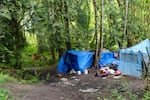Debbie Perrine finds a corner table and sets down her tray of food. It’s lunchtime at the Longview Salvation Army food pantry.
When she’s not here, she’s usually quilting or reading a book at the library. Sometimes she has a doctor’s appointment downtown.

Debbie Perrine was one of 60 people staying at Love Overwhelming who were left with nowhere to go after the homeless shelter closed.
Molly Solomon / OPB
But when the sun starts to go down, she packs everything up and heads toward the river. Like many homeless men and women in rural or suburban parts of the Pacific Northwest, she has few options for getting indoors — and in her case, the list of available shelters is shrinking.
Perrine says she fell into homelessness a couple years ago when her husband, Daniel, passed away from cancer. Most of their savings went toward his medical bills.
“Me and him was together for 26 years,” Perrine said. “After 26 years of being together, you don’t think that one moment to the next you’re going to all of a sudden be homeless.”
Debbie and Daniel Perrine lived in Colorado, but she couldn’t afford to keep their apartment on her own after he died.
Related: SW Washington Nonprofit Wants To Build Microhomes For Homeless Female Veterans
“I didn’t have a place to stay, and I knew I was going to be homeless,” she said. “So, I ended up coming home.”
Before Perrine met her husband, she was a Washingtonian, born and raised in Snohomish County. She moved back after his death to figure out her next steps.
Perrine knew she didn’t want to go to a big city like Seattle. Too many drugs and too much danger there, she said. Instead, she set her sights on Kelso, a small town with a low-barrier emergency shelter called Love Overwhelming. She was there for about eight months when the shelter announced it would be shutting down.
“When the shelter closed, I knew I was going to have to camp out somewhere,” Perrine said. “But then that brought up issues like where would I be able to go.”
Perrine is one of about 60 people who ended up back on the street after Love Overwhelming closed in late March earlier this year.

Homeless service providers say counting homeless in rural areas can be more difficult because they are often less visible than in urban areas. After Love Overwhelming closed, many left town to make camp in the woods.
Molly Solomon / OPB
The nonprofit started as a grassroots organization to help the homeless and those in need in Cowlitz County. After receiving $575,000 in grants from the county — including just under $200,000 for a low-barrier shelter — Love Overwhelming opened in 2015.
There were two other shelters already open that served the area, one run by Emergency Support Shelter for domestic violence victims and Community House on Broadway, a more selective shelter that requires guests to be drug and alcohol-free.
Love Overwhelming wanted to reach a different group of people: the chronically homeless. Their model was based off what's known as a "housing first" approach. That means sobriety isn’t a requirement, and there aren’t as many rules. Instead, service providers try to get people indoors first, then work to address the underlying problems that may have led guests to the streets.
Such flexibility opened up the option of shelter to an entire population that was not being served in Cowlitz County.
“We had projected around 350 people coming through for the whole year,” said Love Overwhelming Executive Director Chuck Hendrickson. “And within the first weekend, we had that many people come through our doors.”
Hendrickson said the shelter's clients had been living in people’s garages, under bridges, in the woods by the river.
The shelter also attracted complaints from nearby residents and businesses. Kelso Mayor David Futcher said the response was immediate.

Kelso Mayor David Futcher said the city experienced an uptick in calls to police, the fire department and other emergency services. He also heard complaints from local business owners and residents.
Molly Solomon / OPB
“Love Overwhelming opened up and all of a sudden our calls for services at the city spiked. Police calls, calls to the fire department, those spiked,” Futcher said. “It made the problem a lot more visible.”
County records show that within the first six months of the shelter opening, 445 calls were made to local police and the county sheriff’s department. The year before, the department recorded only 39 calls for that same period.
Homeowners began showing up at city council meetings complaining that their property values were going down. Others said they believed the shelter was a haven for drug use.
“It’s been a hot button issue ever since they opened up,” Futcher said. “The folks who live near it were really frustrated with having that in their backyard."
The City of Kelso even went so far as to file an injunction to permanently close the shelter less than six months after Love Overwhelming had opened. City leaders and shelter operators ended up settling under the condition that the shelter must beef up security.
It didn’t help that the shelter was also located next door to the county office buildings, and some of the people complaining were government workers. They had the ear of commissioners and county employees with significant political influence.
“We had reports from our own employees at night,” said Dennis Weber, vice-chair of the Cowlitz County Board of Commissioners. “They were going to the parking lot, they felt scared and very insecure because the homeless were hanging out there on their route. We had reports from folks coming in to pay taxes having to step over the homeless who were passed out on the doorsteps. Unfortunately, the programs just weren’t working.”

Dennis Weber is the vice-chair of the Cowlitz County Board of Commissioners. He says the county felt it had not other choice but to buy the building next door, forcing the shelter Love Overwhelming to move elsewhere.
Molly Solomon / OPB
Weber says county leaders felt they only had one solution: buy the shelter building. A timeline of the sale requested by OPB shows that Cowlitz County purchasing manager, Matt Hanson, approached Emergency Support Services, the building’s owners, in May 2016 to ask if it was available for sale. In October, the Board of County Commissioners unanimously agreed to spend $250,000 to purchase it.
“That seemed to be the only thing that was going to put an end to the nightmare that we were experiencing,” said Weber.
In order for the property to change hands, Love Overwhelming had to leave. The shelter’s last day was the end of March earlier this year. The building is still in escrow and remains empty. The county has not made any announcements for how they plan to use it.
Executive Director Chuck Hendrickson spent the last morning passing out tents, portable stoves, food and clothing.
“It’s really unfortunate,” he said. “We want to serve the people the best we can. And we lose track of people a lot of times. We really were a hub.”
Sixty people ended up on the streets when the shelter closed because Love Overwhelming could not simply pick up and reopen elsewhere. There were no other suitable sites in Kelso. And neighboring Longview has a ban in place on any new shelters.
Longview City Councilor Steve Moon said he and his colleagues got the idea after paying close attention to Love Overwhelming and its deteriorating reputation in Kelso.
Related: As Homelessness Increases, Vancouver Struggles To Find Solutions
“We wanted to make sure that when a shelter moved into our community, they were zoned properly and to the best location that seemed fit,” he said.
The initial ban was put in place two years ago, but it’s been extended several times since then. Moon says the city is close to finalizing a zoning plan for future shelters and recently presented a proposal to the public. But it still has to go through a more formal comment period and be approved by the full council. For now, Longview's ban on any new homeless shelters remains in effect through September.
The closure of Love Overwhelming and the moratorium on shelter in Longview left homeless men and women in the area with few options. Caleb Luther, who is in charge of the outreach program at Love Overwhelming, says the closure of the shelter has made it more difficult for him and his team. Now that there’s no shelter, Luther often drives to the outskirts of town to track down former clients.

Homeless service providers say rural areas can be more difficult to track homelessness. In Cowlitz County, outreach workers have seen an uptick of camps in the woods outside of town.
Molly Solomon / OPB
"They’re in sheds, alleys, camps out in the woods," he said. "That makes it tough for us to look for them when there is assistance, and also we spend our time and energy helping them survive.”
On one search for people in need, Luther slows down along the train tracks by the Cowlitz River, about 10 minutes outside of town. He points to several blue dots among the trees.
“I can see camps up in there,” he says pointing to tarps hung up by people sleeping in the woods.
Luther says he or someone from his team come out here once a week. They offer rides into town if people need to go to work, get food or see a doctor. He says the number of tents in the woods has ticked up.
“We knew some of them had gone to camp,” he said. “We asked a guy staying here last week if it had increased, and he said, 'Oh, yeah.'”
But camps aren't a stable solution. Luther says a lot of camps closer to town, and more visible to law enforcement, end up getting cleared.
“Everybody’s question is, 'Where do I go?'” he said.
“We see camps cropping up all over the place,” said Longview resident Chris Pegg. “A lot of camps down by the river. You see people sleeping under the bridges. So I think they’re just finding whatever place they can for the night.”

Cowlitz County owned the buildings next door to the homeless shelter Love Overwhelming. The buildings included the Cowlitz County Commissioners and other government workers.
Molly Solomon / OPB
Pegg is the CEO of Housing Opportunities of Southwest Washington, which helps find affordable housing for low-income people in the region.
Pegg says there are many reasons people end up homeless. Some have mental health issues or addiction problems. But a lot of times, men and women end up on the streets for financial reasons. Cowlitz County was hit hard by the recession and has been slow to recover.
“There’s not a lot of jobs available. The housing costs are skyrocketing. The availability of housing is really limited,” she said. “And we’re really limited in our shelter space.”
In 2015, the number of people living on the streets of Cowlitz County grew by 54 percent. The most recent Point in Time count estimates about 344 homeless individuals and families in Cowlitz County. Those numbers may not seem like much compared to larger cities like Portland or Vancouver, but they mirror a national trend: Across the country, poverty is growing faster in suburbs than cities.
Related: Washington's Homeless Population Grew 3.5 Percent Last Year
Homelessness is challenging enough in urban areas but can be even harder to overcome in suburbs and small towns because it's often hidden and, for a lot of residents, brand new. Rural counties often don't have an infrastructure for dealing with a rising and more visible homeless population.
Pegg, who has lived in Longview for nearly 40 years, says she’s seen a shift in the community over homelessness. Voices, especially those in opposition, have gotten louder — and uglier — at public meetings.
“We’re seeing a level of hostility and a willingness to say things to people and about people that I haven’t seen before,” she said. “Really contentious, divisive conversations.”
The debate intensified after word got out that Love Overwhelming was considering relocating to nearby Longview. City council meetings grew from 20 people to a packed room of 150 people.
A recent meeting to reconsider the city’s shelter ban was held in an assembly hall that could accommodate 300 people. At one point, it was standing-room only.
“A lot of it is about Love Overwhelming,” said Pegg, who has attended several of the meetings to discuss homelessness. “The meetings turn into more of a discussion about Love Overwhelming, rather than talking about a homeless ordinance.”
With a ban on new shelters still in place, Longview city councilors hope to have a new ordinance passed by the end of the year.
In the meantime, people like Debbie Perrine are still looking for a place to stay.
After the Kelso shelter closed in March, Perrine was able to buy some time. Her caseworker found her a family that was in the process of selling their home, so for a couple of months, she stayed in their extra room and left during the day when a real-estate agent came by to show the house.
But the property recently sold, and Perrine is once again in survival mode.
She plans to start looking for a new place to set up camp — one that will likely take her back to the woods.